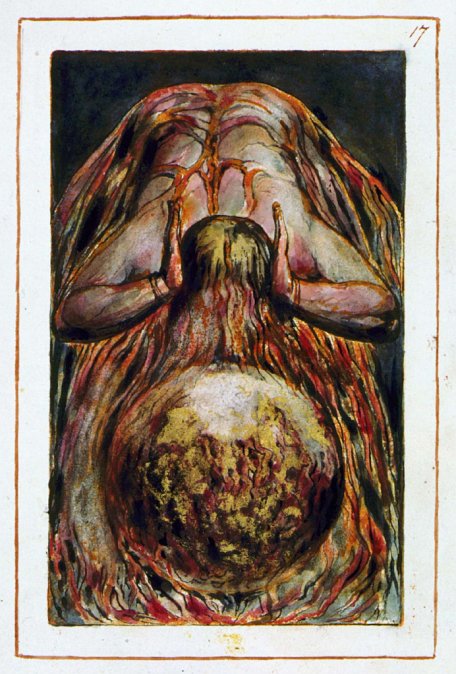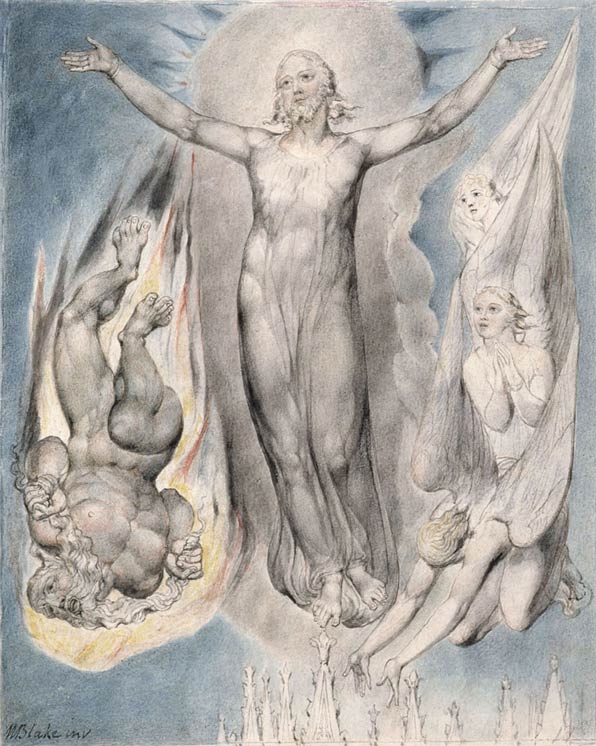Ahania the emanation of Urizen, playing the loyal wife, wants to help Urizen avoid the consequences of a bad decision. She attempts to build his ego; she places the blame on Luvah; she make excuses for Urizen. But her supportiveness is to no avail. When she asks that Urizen listen to her vision he turns against her.
Four Zoas, Night III, PAGE 38, (E 326)
"O Prince the Eternal One hath set thee leader of his hosts
PAGE 39
Leave all futurity to him Resume thy fields of Light
Why didst thou listen to the voice of Luvah that dread morn
To give the immortal steeds of light to his deceitful hands
No longer now obedient to thy will thou art compell'd
To forge the curbs of iron & brass to build the iron mangers
To feed them with intoxication from the wine presses of Luvah
Till the Divine Vision & Fruition is quite obliterated
They call thy lions to the fields of blood, they rowze thy tygers
Out of the halls of justice, till these dens thy wisdom framd
Golden & beautiful but O how unlike those sweet fields of bliss
Where liberty was justice & eternal science was mercy
Then O my dear lord listen to Ahania, listen to the vision
The vision of Ahania in the slumbers of Urizen
When Urizen slept in the porch & the Ancient Man was smitten"
 Image from proof title page
Image from proof title pageEurope a Prophecy
1794
Here Ahania presents a long prophetic vision which Urizen finds disturbing. Rather than giving his attention to the scenario presented to him by the part of his mind which allows him to draw back from the relentless pursuit of exercising control, he turns control over to his emotions. Luvah and Vala are ready and willing to become active. In her vision Ahania sees Luvah, Vala and Albion being dragged down into outer manifestations. Nature attains an autonomous existence as Vala becomes distant from Luvah, the spirit whom she should incorporate. Urizen feels compelled to once again exercise control by declaring himself the only god.
Four Zoas, Night III, Page 42 (E 328)
"O Urizen why art thou pale at the visions of Ahania
Listen to her who loves thee lest we also are driven away.
They heard the Voice & fled swift as the winters setting sun
And now the Human Blood foamd high, I saw that Luvah & Vala
Went down the Human Heart where Paradise & its joys abounded
In jealous fears in fury & rage, & flames roll'd round their fervid feet
And the vast form of Nature like a Serpent play'd before them
And as they went in folding fires & thunders of the deep
Vala shrunk in like the dark sea that leaves its slimy banks
And from her bosom Luvah fell far as the east & west
And the vast form of Nature like a Serpent roll'd between.
She ended. for [from] his wrathful throne burst forth the black hail storm
Am I not God said Urizen. Who is Equal to me
Do I not stretch the heavens abroad or fold them up like a garment
He spoke mustering his heavy clouds around him black opake"
By bringing up the subject of the fall to Urizen, Ahania has precipitated a continuation of the process of falling away from inwardness to outwardness, from the active to the subjective, and from the Eternal to the temporal.
.



